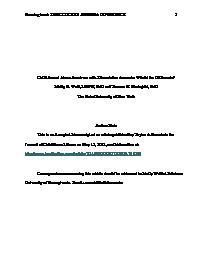Child Sexual Abuse Survivors with Dissociative Amnesia : What’s the Difference?
Although the issue of dissociative amnesia in adult survivors of child sexual abuse has been contentious, many research studies have shown that there is a subset of child sexual abuse survivors who have forgotten their abuse and later remembered it. Child sexual abuse survivors with dissociative amnesia histories have different formative and therapeutic issues than survivors of child sexual abuse who have had continuous memory of their abuse. This article first discusses those differences in terms of the moderating risk factors for developing dissociative amnesia (e.g., age, ethnicity, gender, etc.) and then mediating risk factors (e.g., social support, trait dissociativity, etc.). The differences between the two types of survivors are then explored in terms of treatment issues.
Geachte bezoeker,
De informatie die u nu opvraagt, kan door psychotraumanet niet aan u worden getoond. Dit kan verschillende redenen hebben,
waarvan (bescherming van het) auteursrecht de meeste voorkomende is. Wanneer het mogelijk is om u door te verwijzen naar de bron
van deze informatie, dan ziet u hier onder een link naar die plek.
Als er geen link staat, kunt u contact opnemen met de bibliotheek,
die u verder op weg kan helpen.
Met vriendelijke groet,
Het psychotraumanet-team.
In: Journal of Child Sexual Abuse ; ISSN: (Print)1053-8712 (Online)1547-0679 | 22 | 4 | 462-480
https://www.tandfonline.com/doi/abs/10.1080/10538712.2013.781094


